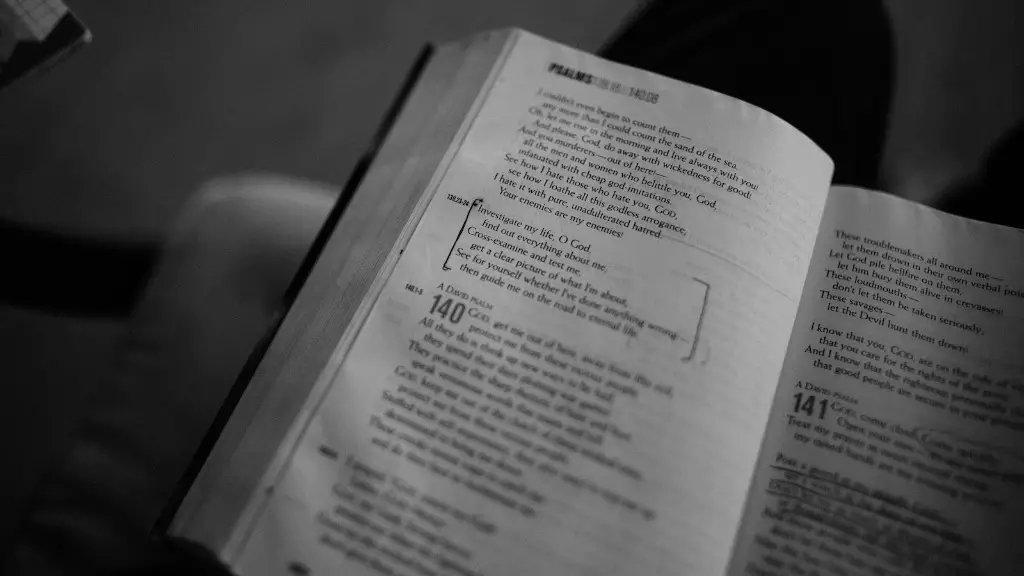The Bible is one of the oldest and most widely-read books in the world. It is estimated that over five billion copies of the Bible have been published and distributed since the first edition was created in the 16th century. Over the centuries, the Bible has been subjected to close scrutiny by scholars, skeptics and believers alike. All sides have tried to ascertain the accuracy of its stories, prophecies and teachings. So, is the Bible an accurate representation of truth and history?
To examine the accuracy of the Bible, it is important to understand the different genres that it contains. The Bible is made up of 66 books that together provide a comprehensive account of human history, from Creation to the mostly-unrecorded events following the death of Jesus. Scholars divide the Bible into different genres, or categories, including Law, Poetry, Prophecy, Wisdom and History. Each genre has specific characteristics and conventions.
When it comes to accuracy, the Bible fares better than many other ancient books. Historical evidence shows that the authors of the Bible used reliable sources and accurate information when writing about events that occurred in ancient times. In addition, archaeological finds, such as coins and pottery, can often be compared against biblical accounts and will often coincide. One example is the Assyrian prism, which was discovered in 1830 and which provided the first written evidence of a biblical figure.
Prophetic writings in the Bible have been carefully studied, and many have come true with amazing accuracy. For instance, centuries before the birth of Christ, prophets wrote that the Messiah would be born in Bethlehem (Micah 5:2). This prediction has been fulfilled and is widely accepted as historical fact.
However, there are some things in the Bible that are not historically accurate, or that can be interpreted differently by different people. Certain prophecies may have been fulfilled many years after they were written, or may have been fulfilled in a way that is not immediately obvious. Events that are described in the Bible may have been exaggerated, distorted or misinterpreted. It is also important to remember that the Bible was written in a particular context and may not be valid in all situations.
Ultimately, it is up to the individual to decide whether to accept the Bible as authoritative. The Bible has been studied by many people over the centuries and there is no definitive answer to the question of its accuracy. In the end, it is a matter of personal opinion and interpretation.
The Use of Source Materials
The Bible was written over a period of many centuries, from the Bronze Age to the Roman Empire, and many different sources were used by ancient authors or editors. It’s thought that some stories were handed down orally, while others were taken from written sources, such as the works of poets, historians and prophets. The authors of the Bible used these sources to create some of the books, but much of the material was likely changed or added to over time.
It’s often said that the Bible is full of contradictions, however, scholars point out that it is important to understand the different source materials used to craft its stories. When contradictions do arise, it can usually be explained by looking at the context in which the story was written and the source material that was used. By taking this approach, the Bible can often be seen as more consistent than it initially appears.
The Bible is also thought to contain evidence of its own accuracy. Many historical facts mentioned in the Bible have been confirmed by archaeological evidence and other sources. In addition, there are several details that could only have been known by someone who lived in the ancient world. These details are so specific and accurate that they could not have been known by someone living centuries later.
For example, there are several references to ancient cities that have been confirmed by archaeological finds, including Jericho and Ur. In some cases, the Bible may even provide the first written accounts of certain cities or events, such as the destruction of Sodom and Gomorrah.
The Bible and Science
The Bible is sometimes seen as contradictory to science, however, it can often be seen as complementary. Both science and the Bible deal with the natural world, but they do so in different ways. Science deals with matters of fact and evidence, while the Bible deals with matters of faith.
The Bible does not provide the same level of detail as scientific books, but that does not mean that it is necessarily wrong. In fact, some of the stories found in the Bible have been validated by scientific research. For example, certain events relating to earthquakes and the movements of the planets are often mentioned in the Bible and have been confirmed by scientific studies.
It is also important to remember that science is constantly evolving and that our understanding of the natural world is always changing. What may have been accepted as fact one hundred years ago may not be accepted as fact now. So, when it comes to the accuracy of the Bible, it is important to keep an open mind and to remember that our understanding of the world is constantly changing.
The Bible and Culture
The Bible was written within a certain culture and context, and its accuracy must be considered within those parameters. It is important to remember that the Bible reflects the culture of the time in which it was written and may not be applicable today. For example, many of the laws and rules described in the Bible were considered to be applicable specifically to the people of ancient Israel and may not be applicable in our society today.
Similarly, the Bible contains many stories and parables that were designed to teach moral or spiritual lessons, and not necessarily to be seen as historical fact. For example, the tales of Jonah and the whale or of balaam’s talking donkey may not have really happened, but they have important lessons to teach us.
Overall, the Bible is an important source of spiritual guidance and moral instruction. Its accuracy should not be judged on a scholarly or scientific level, but on the moral and spiritual lessons that it contains. It is up to each individual to decide how to interpret the stories and lessons found in the Bible.
Conclusion
The accuracy of the Bible is an important question that has been debated for centuries. Scholars, believers and skeptics have all sought to ascertain the truth about its authors’ sources and its reliability. While there is no definitive answer to the question of accuracy, the evidence suggests that the authors of the Bible were careful to use reliable sources and accurate information when writing about ancient events. Several prophecies have been fulfilled with remarkable accuracy, and the Bible contains many details that could only have been known to someone living in the ancient world.
Ultimately, the accuracy of the Bible is a personal opinion and it is up to each individual to decide how to interpret its stories and teachings. The Bible is an important source of spiritual guidance, and its accuracy should be judged on the moral and spiritual lessons it contains, not on its accuracy as a scientific or historical document.




